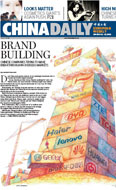Op-Ed Contributors
US' strategy threatened by turmoil
Updated: 2011-03-07 08:06
By Li Qingsi (China Daily)
The escalating upheavals in the Middle East and North Africa have aroused great global concern. Local authorities' poor governance contributed to the clashes, but external forces have played a role in fanning the flames and have attempted to influence the development of local affairs in accordance with their own desires.
With the increasing interdependence among countries and the extreme imbalance between small and big countries and developed and developing countries, there are few nations that can keep the initiative in their own hands and be immune from the influence of outside powers and act independently.
Even in an era of globalization, the bargaining and competition among major powers determine the overall landscape of world affairs, and those powerful countries and the nature of their diplomacy are still the major force in shaping the international framework.
But, as none of the major powers can bear the consequences of head-on collisions, they usually choose to compete in a buffer zone or existing sphere of influence.
Shortly after World War II, the United States incorporated the Middle East into its sphere of influence, taking the role of the European colonial states. By energetically nurturing Israel and dividing the Arab world, the US attained its goal of dominating the oil resources and the transportation routes in the Middle East, as well as influencing its allies and new oil consumption countries.
While the US always claims that its Middle East policy is determined by a country's level of democracy, human rights and morality, it is actually governed by whether a country is pro-US or not. In fact, the issues in many countries in the Middle East and North Africa have much to do with the intervention of the US and other Western nations. Both the Saddam Hussein regime and the Hosni Mubarak government once received support from the US, not to mention Washington's constant partiality for Israel in the Israeli-Palestinian conflict.
Without unity and without external support, poor Arab countries find it difficult to be masters of their own destinies; many of the problems they now face have their roots in economic development. Meanwhile, those rich Middle East monarchies, which rely on their huge oil wealth and the support of the US, have avoided the storm.
However, by putting its own interests first and pursuing double standards the US has fostered local religious factions and rampant extremism that might leave Washington's Middle East strategy in disarray.
In fact, no other region has stronger anti-US public opinion than the Middle East and it is the root cause of the US' lack of security guarantee for the world.
Regardless of what factors caused the turbulence in the Middle East and North Africa, the fact is that the sphere of influence of the US in the region has been affected. Rapid changes in the political landscape from Egypt to Bahrain have dealt a heavy blow to the US. The spreading turbulence gives various anti-US forces an opportunity to show off their muscles.
In particular, Iran took the opportunity to send warships through the Suez Canal en route to Syria, expressing support for Israel's opponent and acting as a matchmaker among those Middle East countries that are against Israel. If Al-Qaida also wants to fish in the troubled waters of Iraq and surrounding areas and finally pose a threat to Israel, Washington's long-term Middle East strategy will face a big problem.
Considering that the Middle East is one of the pillars of the US' global hegemony and expanding turbulence in the region has caused the price of crude oil to rise, it is Washington's responsibility to maintain stability in the Middle East and North Africa. After all, only the US has the capability and influence to do so.
The author is a professor at the School of International Studies, Renmin University of China.
(China Daily 03/07/2011 page9)
E-paper

Factory fever
Despite auto manufacturing bubble scare, car giants gear up expansion of factories.
Dressed for success
Fabric of change
High spirits
Specials

Earthquake Hits Japan
A massive 8.8 magnitude quake hit the northeast coast of Japan on March 11,2011.

NPC & CPPCC sessions
Lawmakers and political advisers gather in Beijing to discuss major issues.

Slide: Japan quake
Devastating earthquake and tsunami left millions without water, electricity, homes or heat.
